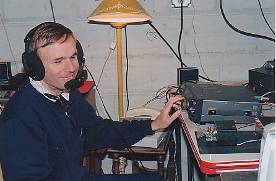
|
The Golden Rule of friendship is to listen to others as you would have them listen to you. |
|
TWISTING THE DIAL FOR ALL THESE YEARS
I have been a radio enthusiast for as long as I can remember. I enjoyed listening to some of the radio dramas that aired during the 1950ís. My first experience in listening to shortwave radio was at an uncleís home.† We could listen to the Boston Police and Radio Moscow all on one big tube-type receiver. Another uncle had his Amateur Radio license and that was my first exposure to ham radio.
At Perkins School for the Blind, we had a club station where I would listen to my friends make contacts all over the world from a basement ham shack. Each year during the schoolís open house, my friends would be scheduled to operate in the main hall of the school with a wire antenna that went over the bell tower.†
After all of this exposure and becoming a Citizens Band (CB) operator, I passed my novice exam in October of 1966 at age 16. My first contact using Morse code was with a station in Sweden and I was hooked!
Over the years I have made many friends, some for a nice 15-minute chat and some for a lifetime. You realize very quickly that we are all the same, making a living, bringing up a family and trying to make it in this world. I will always remember having a Morse code conversation with a station in Czechoslovakia within five hours before the Russians invaded in 1968. † Much of my ham radio time in Natick has focused on emergency communications.† We run a continuous weekly net where we gather on a specific frequency and at a certain time; it has been running for more than 12 years. Through a network of hams located throughout the country, I have passed and delivered numerous messages of greetings to hams and non-hams alike.† These activities, plus participating in simulated emergencies and public service events, prepare us for the day when an emergency occurs. It is important to operate ham radio in a way that can assist the community while enjoying the hobby. With all of the technology that now exists, ham radio is still the backbone of citizen communication. When other infrastructures are overloaded or off-line during a disaster such as an earthquake or hurricane, emergency powered ham radio stations can deliver messages in and out of an affected area and may be one of few links to the outside world. All forms of government, the Red Cross, Salvation Army and other emergency organizations have long-held written agreements with the ham radio community to swing in to action as soon as an emergency is declared.
Ham radio has been a life-long interest and hobby. Ham radio constantly reminds me of the importance to listen first and talk second. One can only be a good communicator when you listen to others and respond to what they say. Radio communication still carries on the tradition of a true two-way conversation.
†Joe,† W1HAI
©Natasha Bochkov, M.C.S., Martin Bayes, Ph.D., and Donna LaRoche, M.Ed. |

|
Here is a photo of Mr. Joe Weisse, W1HAI. |
|
Letís meet Mr. Joseph Weisse, W1HAI |